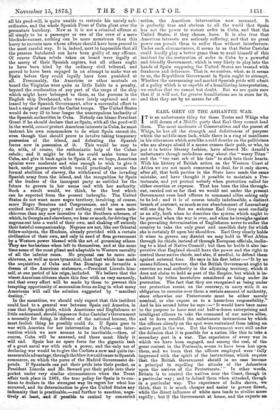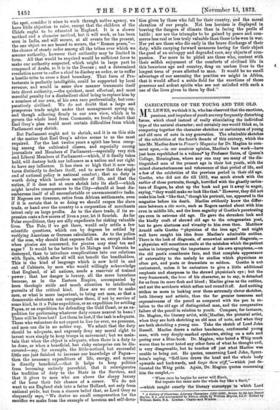EARL GREY ON THE ASHANTEE WAR.
T is an unfortunate thing for those Tories and Whigs who I still dream of a Middle party that Earl Grey cannot lead them. The most moderate of Conservatives and the purest of Whigs, he has all the strength and definiteness of - purpose which the middle-men lack, while there is a ring of manliness in his utterances which acts like a cold douche on the politicians who are always afraid if a mouse crosses their path, or who, to put it in better literary fashion, have allowed Mr. Arnold's unfortunate though melodious song about the " weary Titan" and the "too vast orb of his fate" to sink into their hearts. With his history of British action on the Western Coast of Africa we are not much concerned to deal, for it only shows, after all, that both parties in the State have made the same- mistake, and have thought it possible to maintain a Pro- tectorate, and yet protect nobody when protection called for either exertion or expense. That has been the idea through- out, carried out so far that we would not under the present Government even lend officers to command allies asking only to be led ; and it is of course totally indefensible, a distinct breach of contract, as much as our abandonment of Luxemburg will one day be. But we welcome Earl Grey most cordially as an ally, both when he describes the system which ought to be pursued when the war is over, and when he inveighs against the prevailing determination of Englishmen never to suffer the country to take the only great and unselfish duty for which she is certainly fit upon her shoulders. Earl Grey clearly holds it wiser to govern any district we may hold in West Africa through its chiefs, instead of through European officials, inclin- ing to a kind of Native Council ; but then he holds it also im- perative that England should have the power and the right to control these native chiefs, and also, if needful, to defend them against external foes. He says in his first letter:—"It by no means follows, however, that the British Government ought to exercise no real authority in the adjoining territory, which it does not claim to hold as part of the Empire, but which is in- habited by tribes heretofore considered as being under. its protection. The fact that they are recognised as being under our protection seems, on the contrary, to carry with it an obligation to exercise over them a certain amount of authority, since otherwise our Protectorate must be either merely nominal, or else expose us to a hazardous responsibility. And in his second letter he says :—" It would have been more to the purpose to have sent out half-a-dozen enterprising and intelligent officers to take the command of our native allies, and to have recalled the unfortunate instructions by which. the officers already on the spot were restrained from taking an• active part in the war. But the Government were still under the delusion that it is possible for a nation like this to take a secondary part in a war. The experience of every war in which we have been engaged, and among the rest, of the great contest in the Peninsula, seems to have been lost upon them, and we learn that the officers employed were fully impressed with the spirit of the instructions, which require that the British Government should in no ease become a principal in repelling the attacks of the Ashanteea upon the natives of the Protectorate.' " In other words, Britain is to control the natives near the Coast, though in a particular way ; and to defend them when attacked, though in a particular way. The experience of India shows, we think, that it is much cheaper and easier to govern direct, while the direct influence of white men tends to civilise more rapidly ; but if the Government at home, and the experts on
merciful penalty for a disobedient chief being to replace him by a nominee of our own, of his own race preferentially, but com- paratively civilised. We do not doubt that a large and CARICATURES OF THE YOUNG AND THE OLD. prosperous trade might under that management spring up, and though adhering firmly to our own view, which is to ing among the cultivated classes, and especially among journalists and Members of Parliament—especially very rich tutee distinctly to declare itself, and to avow that the single end of national policy is national comfort ; that no duty is a few of the celebrities of the previous period in their old age. worth doing which involves sacrifice of life, and that the Goethe, who did not die till 1832, was much struck with the nation, if it does not at once shrink into its shell—which earlier of these portraits, though, horrified with the ghastly carica- might involve consequences to the City—should at least dis- ture of Rogers, he shut up the book and put it away in anger, embarrass itself of all uncomfortable or unremunerative tasks. saying, "they would make me look like that." However, they did not If Negroes are tiresome, retire from African settlements, even make him look "like that," though his portrait, too, appeared in the if it is certain that in so doing we should reopen the slave magazine before his death. Maclise evidently knew the differ- trade, or hand over the country to a corporation of merchants ence between a tete morte, such as Rogers carried about with him intent only on large profits. As to the slave trade, if its re- even in middle life, and the keen sagacity of Goethe's penetrating pression costs a few scores of lives a year, let it flourish. As for eye even in extreme old age. He gave the shrunken look and Polar expeditions, they are silly expedients for risking valuable the kindly craft of shrewd old age to the octogenarian poet, lives. The Pole, if we got there, would only settle a few but he gave alertness and vivacity to him even then. Matthew scientific questions, which can by degrees be settled by Arnold calls Goethe "physician of the iron age," and might verifying American or German calculations. As to the police well have caught his idea from Maclise's admirable outline. of the seas, why should that expense fall on us, except indeed There is the look of diagnosis, of somewhat amused diagnosis,— when pirates are concerned, for pirates may steal tea and a physician will sometimes smile at the mistakes which the patient sugar ? It would be far better to let Malaga and Valencia be makes in interpreting the importance of his own symptoms,—on destroyed, than to introduce complications into our relations the old poet's considerate face, and that complete appearance with Spain, which after all will not benefit the bondholders. This is the kind of language which is now held in and out of Cabinets, by men who would willingly acknowledge that England, of all nations, needs a reservoir of trained power ; that her danger is luxury, all the more luxurious emphasis and sharpness to the shrewd physician's eye ; but the because, as in the Eastern Empire, accompanied by keen theologic strife and much attention to intellectual for us from its mere flesh and blood ; Maclise gives us the outline, pursuits of the critical kind. How are we ever to make and not the accidents which soften and round it off. And nothing men, or what is more important, to bring out men, so that a strikes us more in looking over these extremely clever sketches, b
democratic electorate can recognise them, if not by service of both literary and artistic, than the far greater terseness and some kind, be it a Polar expedition, or an expedition for settling expressiveness of the pencil as compared with the pen in re- lation to the old age of distinguished men, and the comparative Papua, or an expedition for defending the Gold Coast, or an ex- pedition for performing whatever duty comes nearest to hanu ? failure of the pencil in relation to youth. Compare, for instance, There will be lives lost? Let them be lost, if the task is adequate. Dr. Maginn, the literary artist, witrMaclise, the pictorial artist, Those who volunteer do not expect to live for ever, we presume, when they are both sketching an old man of note, and when they and men can die in no nobler way. We admit that the duty are both sketching a young one. Take the sketch of Lord John should be adequate, and expressly deny any moral right to Russell. Maclise draws a rather handsome, sentimental young invent wars simply to keep troops in movement ; but we main- man, with very deeply-marked eyebrows, sitting on a sofa and tain that when the object is adequate, when there is a duty to poring over a Blue-book. Dr. Maginn, who hated a Whig much be done, or when a beneficial, but risky enterprise can be dis- worse than he ever hated any other form of what he thought evil, covered—say, for example, the little-noticed, but successful is very disagreeable, but he touches off just what Maclise was little one just finished to increase our knowledge of Papua— unable to bring out. He quotes, concerning Lord John, Spnrz- then the necessary expenditure of life, energy, and money heinfa saying, "Self-love draws the head and the whole body is directly beneficial,—that it helps to keep politics upwards and backwards, and keeps them stiff,"—which just de- from becoming entirely parochial, that it reinvigorates lineated the Whig pride. Again, Dr. Maginn quotes concerning the tradition of duty to the State in the Services, and him the couplet,—
that it gives to men who are above the sleepy luxury
of the hour their fair chance of a career. We do not But repeats the same note the whole day like a finch," want to see England sink into a fatter Holland, not only from —which caught exactly the literary stereotype in which Lord
national pride, but from a sincere belief that, as Lord Grey so
eloquently says, " We derive no small compensation for the • d Gallery of Illustrious Literary Characters (1830-1839), Drawn by the late Daniel sacrifice we make from the example of heroism and self-devo- William Bates, B.A. London: cum WIIIMIL



































 Previous page
Previous page